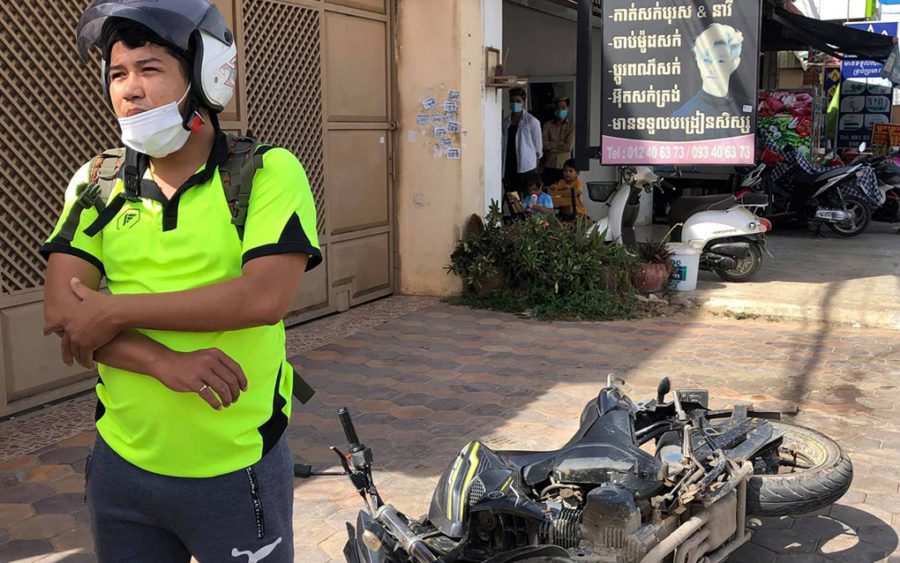Kung Raiya says these days he just sells honey online from his shop, but even doing deliveries for the business has been fraught with danger.
As a 25-year-old university student in 2015, Raiya was arrested over a Facebook post calling for a “color revolution” in the country. He spent 18 months in prison for incitement before his release in 2017.
He was still defiant at the time, telling The Cambodia Daily that he would continue to advocate for his country. “First, I would like to thank the government who put me in jail,” he said in 2017. “Because this experience in prison has made me strong.”
In 2019, Raiya was again arrested in Phnom Penh on the third anniversary of the murder of political analyst Kem Ley for printing T-shirts with Ley’s words and image.
“If you do nothing, you will certainly suffer; it is just not your turn yet,” the T-shirts said, quoting Ley.
At the time of his second arrest, he was married and had a small child.
Raiya was released on bail later that year, and went to Thailand for medical treatment before seeking asylum abroad.
But Raiya, speaking to VOD earlier this month, said he had returned to Cambodia in November so that he could be close to his family. Now in his 30s, Raiya said he had hoped he would be able to develop his honey business.
But in December, a little over a month after his return, he saw a stranger lurking around his house. When he went out for a delivery on his motorbike, he saw the same man drive up to him and kick him over.
Raiya said his helmet spared him from serious injury, but he had gashes on his elbows and knees from being scraped along the road.
Since then, he had barely left his house, Raiya said. He also was done speaking out about issues plaguing society, he said.
“For the matter of social expression, it is related to safety, because now my safety seems to be very fragile, making me worry and fear for my safety if I were to continue to criticize or publicly talk about social issues,” he said.
He kept an eye on what was happening, but political activity was behind him, he said.
The choice over whether to continue to speak out in Cambodia has also racked members of the main opposition CNRP, which was dissolved and outlawed by the Supreme Court in 2017.
A former party youth activist in Phnom Penh, who declined to be named for fear of repercussions, said he had also fled to Thailand for about a month. Since returning, he had received repeated threats, mostly on social media, the activist said.
Now, he had stopped posting online about political issues and severed his links with the CNRP, and the threats gradually decreased, he said. He had feared for his personal safety and had a business to run, he said.
“Now we live a normal life. We cannot do anything, just live to keep safe and for family life. We just adapt to that,” the man said.
Sin Chanpeou Rozeth, a former commune councilor in Battambang, said she also faced pressures and a tough decision about continuing her activism.
She — or her family members — could be attacked at any time, anywhere, like other former CNRP activists had been, she said.
But she still wanted to speak out about the country’s issues, Chanpeou Rozeth said.
“Sometimes we have to take risks too. We don’t know when it will be our turn, when we will be accused, if we continue to criticize,” she said. “But even if we do not show care for our nation, we still know and see the deeds, and if we do not dare to speak, the significance of our lives for this national society will be unknown.”
CNRP vice president Mu Sochua has said that 31 former opposition activists have been attacked in Cambodia since 2017.
However, Chin Malin, spokesperson for the Justice Ministry and the Cambodian Human Rights Commission, dismissed claims that freedom of expression in Cambodia was restricted, especially for former CNRP political activists.
All citizens, including supporters of political parties, have the right to express themselves freely, but they must do so in accordance with the law, Malin said.
“A small number of these activists have had legal problems in the past, not because of a lack of freedom of expression, but because of violations of the law, such as defamatory expressions, infringing on the dignity of others’ privacy, inciting social unrest and such,” he said. “We see the vast majority of people using social media, they express themselves freely without any problems. Why does only this small group have problems?”












